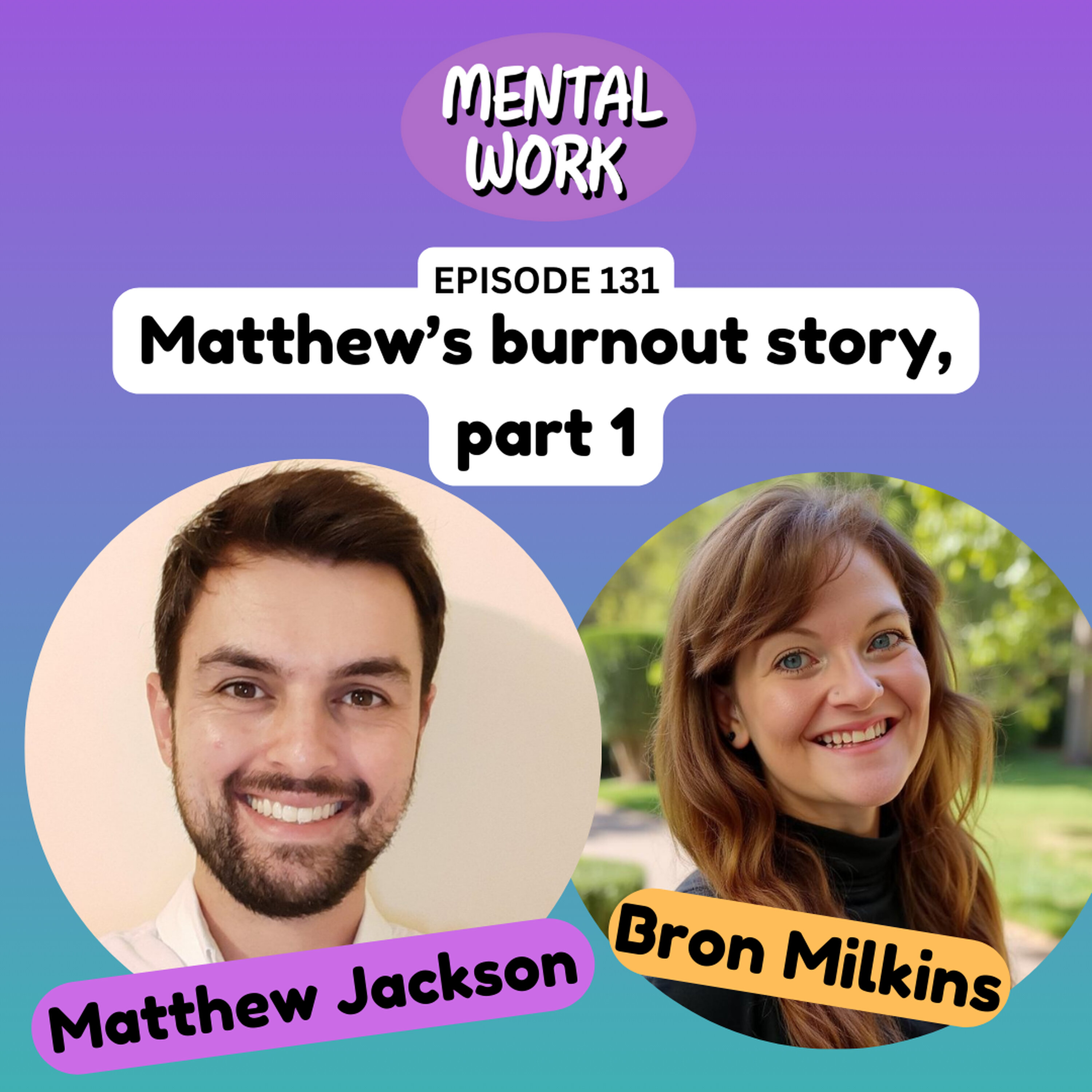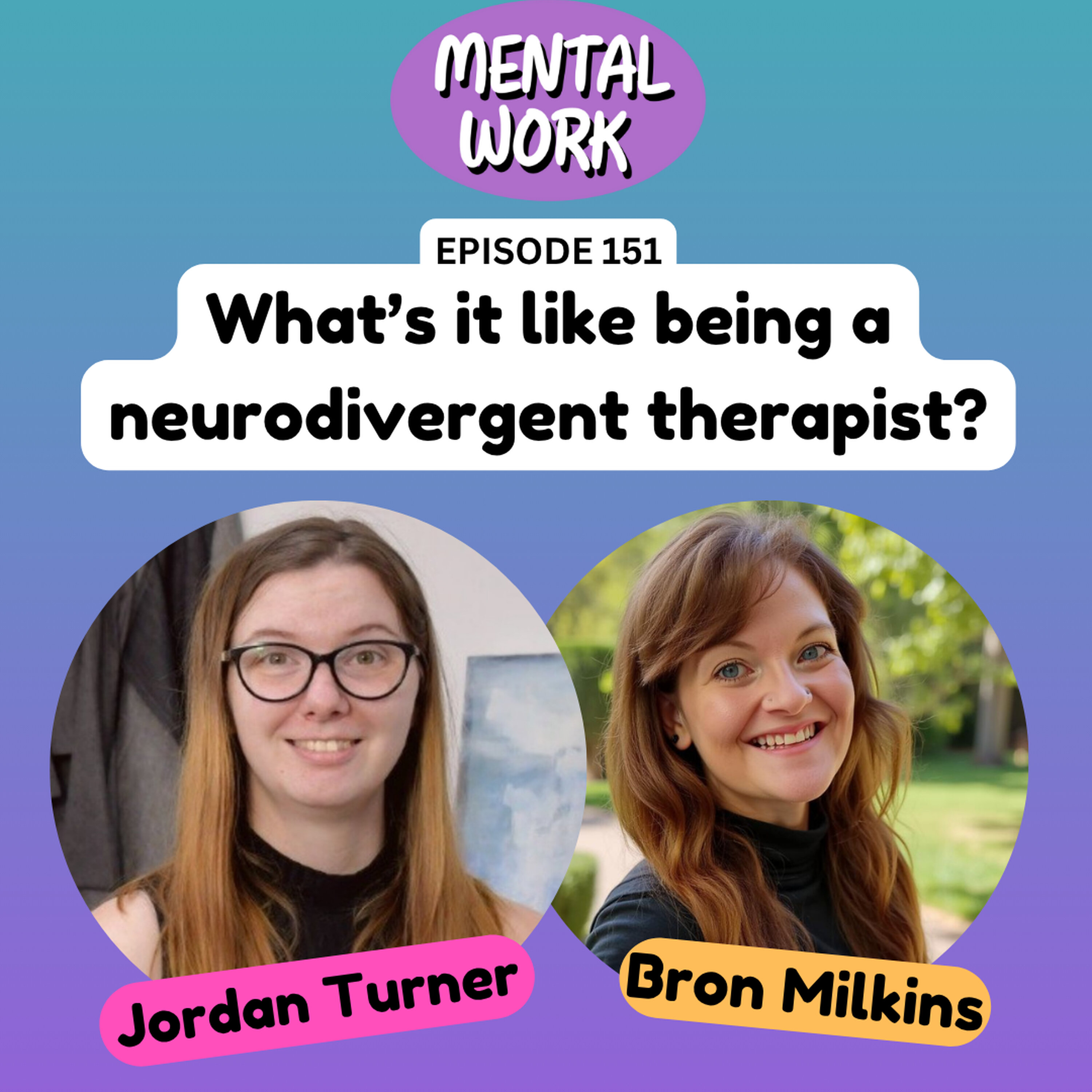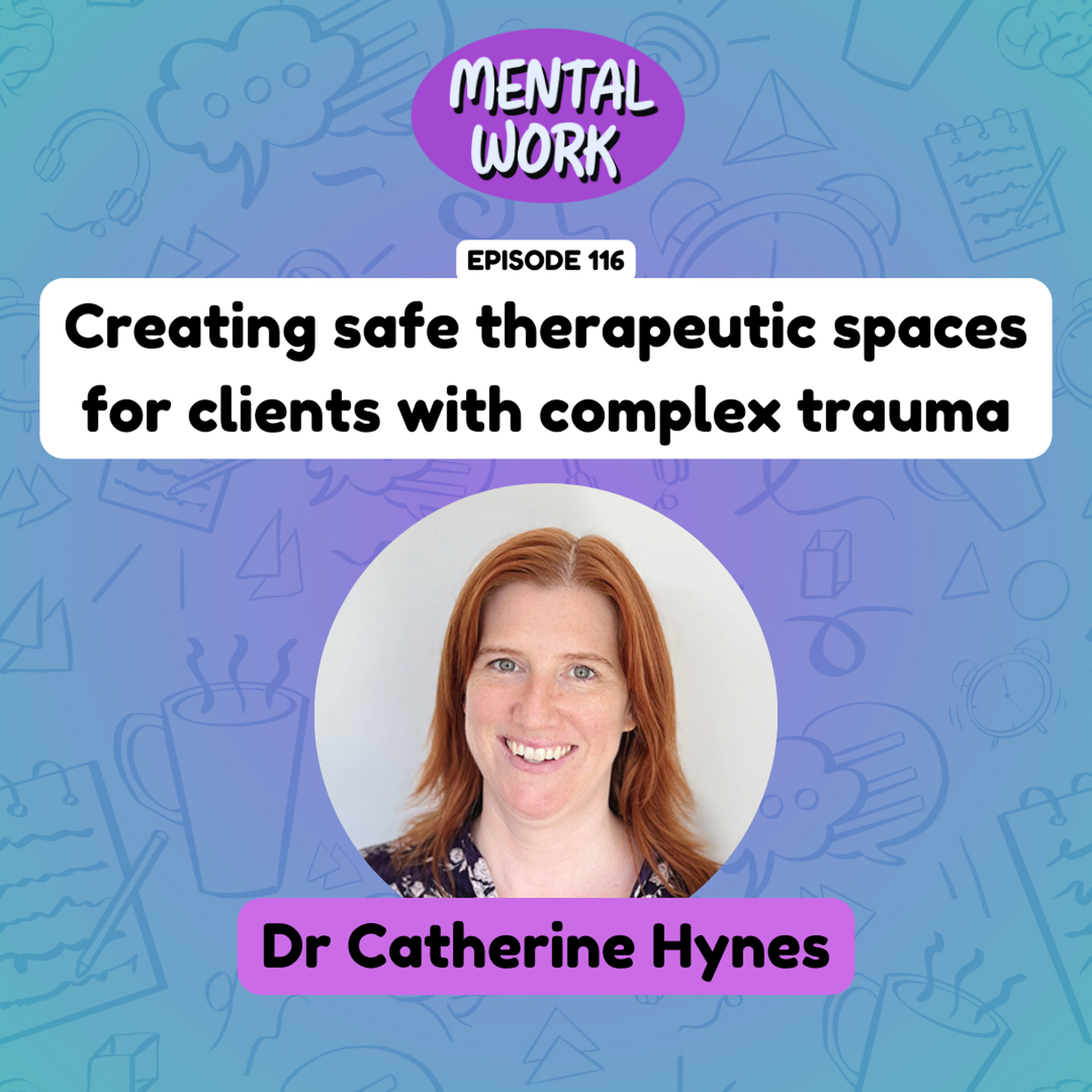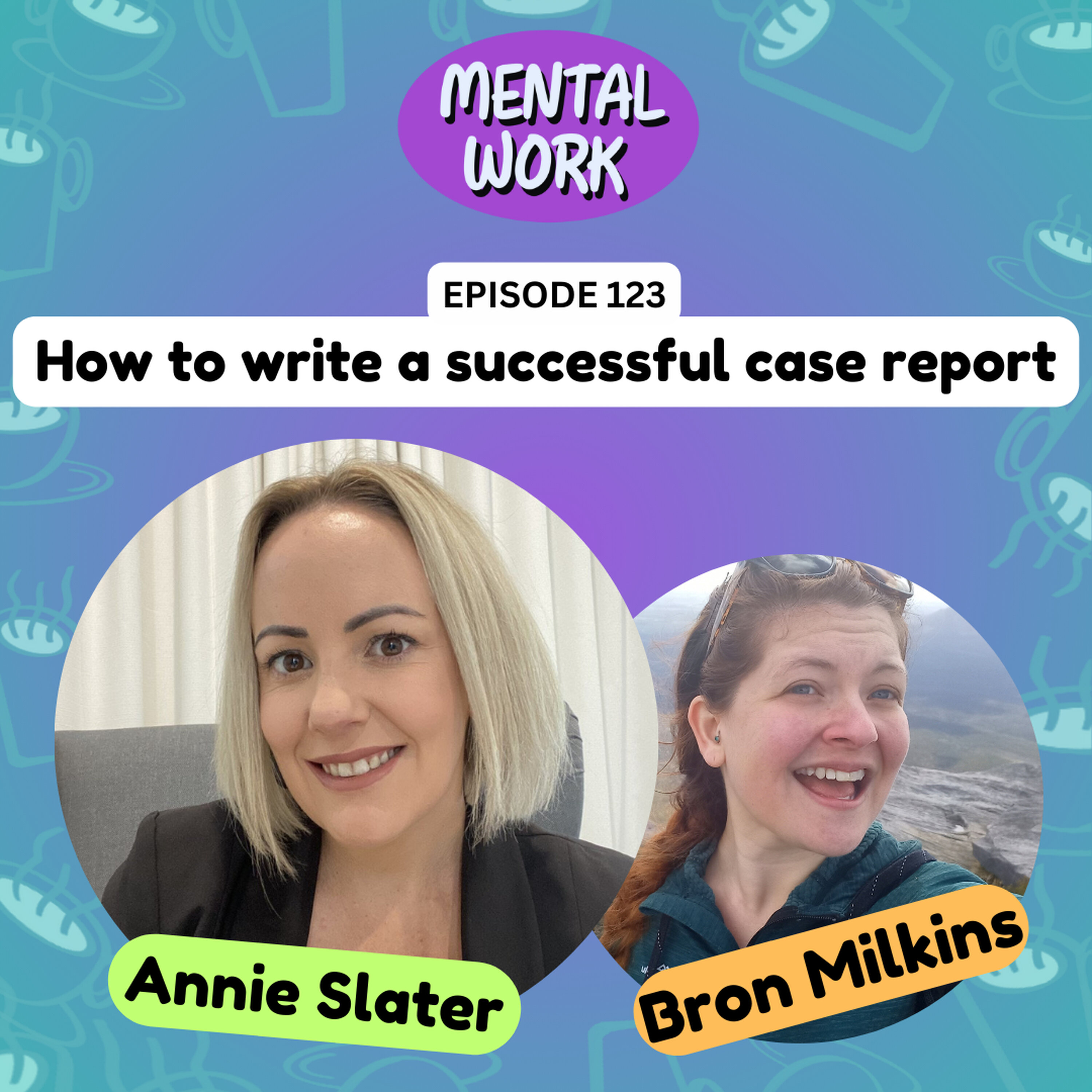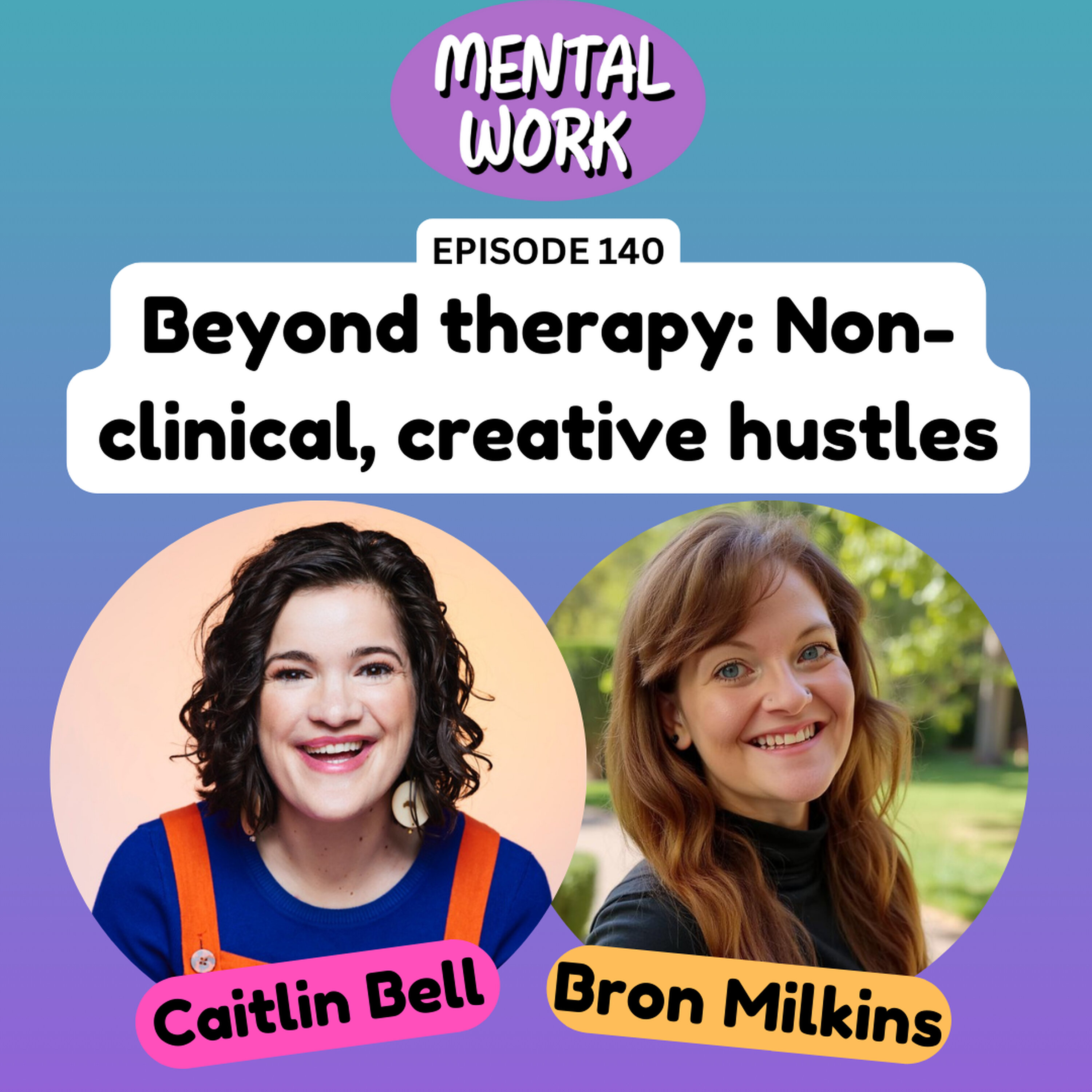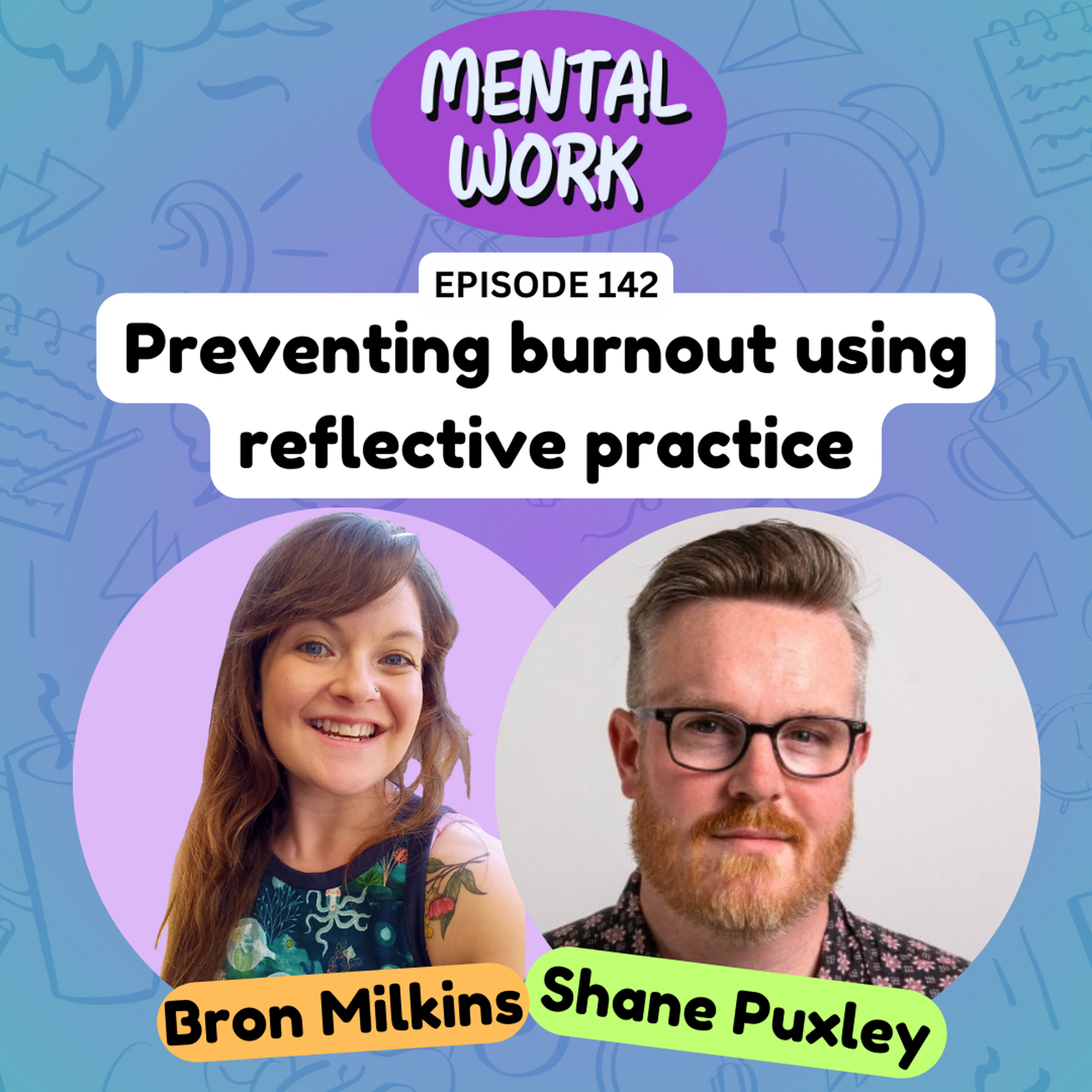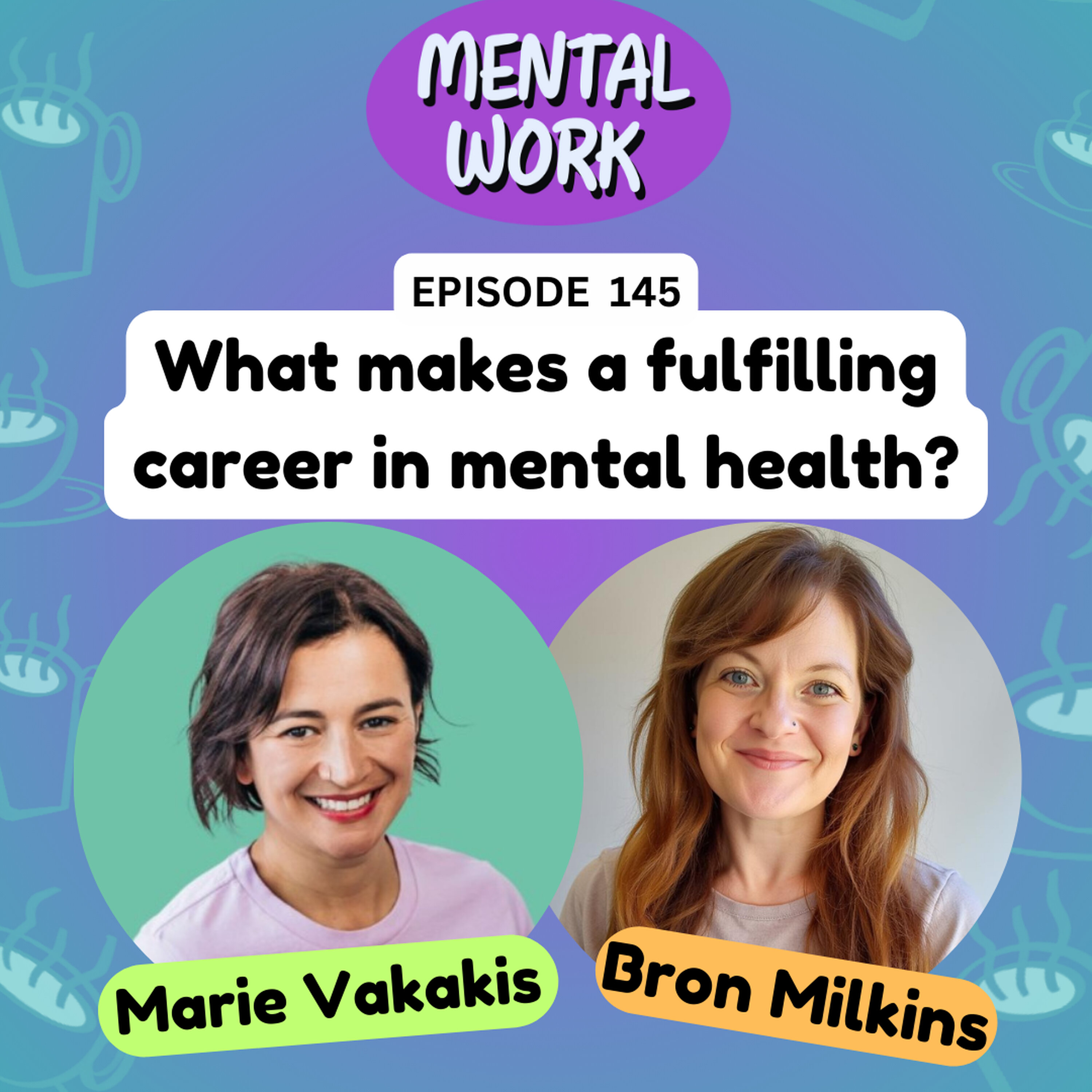BONUS: Insights from an NDIS participant on living with a disability (with Cameron Milkins)

Bron chats with her brother, Cameron, who is an NDIS participant and lives with cerebral palsy. They discuss his experiences, his preferences when working with psychologists, his likes and dislikes in the way people approach his disability, and how the NDIS could improve. Listen in for an insightful chat!
THE END BITS
Mental Work is your companion to early-career psychology, hosted by Dr Bronwyn Milkins.
Love the podcast? Reviews really help! Leave a rating & review on Apple and Spotify.
Keep the pod alive by joining our Patreon for $2 a month 😎
Support the show by buying me a virtual coffee! ☕
We want your episode ideas! What aren't we talking about that early-career psychs need to know? Send it to our mailbag!
Facebook / Instagram / YouTube (with captions & transcript) / Website / Apply to be a guest / Email Bron
CREDITS
Mental Work is sponsored by the Australian Association of Psychologists (AAPi) - Click here to learn more about AAPi and become a member.
Producer: Michael English
Music: Home
See omnystudio.com/listener for privacy information.
[00:00:00] Bronwyn: Hey, mental workers. Welcome back to the Mental Work podcast, your companion to early career psychology, and I'm your host, doctor Bronwyn Milkins. Today, we have a special guest. They are my brother. Hi, Cameron.
[00:00:19] Cameron: Hello, everyone.
[00:00:20] Bronwyn: And the reason why we have my brother on today is because, well, they're an NDIS participant, and we've had an episode that is focused on how psychologists can work well in the NDIS from a psychologist perspective. And I thought it was really important to have the perspective of someone who is actually an NDIS participant, and my brother is one. So we're going to talk about his experience with living with a disability and being an NDIS participant. He's gonna give us some do's and don'ts and I think just really interesting insights into who he is and how he lives.
[00:01:03] Sound good, Cameron?
[00:01:04] Cameron: Sounds like a plan.
[00:01:05] Uh, hello, everyone. My name? is Cameron.
[00:01:07] I enjoy playing video games, Watching movies. I like to go bowling every once in a while.
[00:01:15] Bronwyn: Okay. And what kind of movies are you interested in?
[00:01:20] Cameron: Uh, me, personally, I like the animated movies, like Shrek, um, Turning Red. Um, I also like the Japanese style of anime. so more interested in in those sort of things japan related. Have a dream of going to Japan 1 day and yeah.
[00:01:39] Bronwyn: Cool, and with the games, what kind of games are you interested
[00:01:44] Cameron: a little bit of everything from shooters, puzzle solvers, a little bit of action based.
[00:01:50] Bronwyn: And do you have a favorite game that you're playing right now?
[00:01:52] Cameron: Baldur's Gate. It's like Dungeons and Dragons, role playing pros and cons, Your actions and your consequences. So it's a little bit of role playing game, which I enjoy.
[00:02:04] Bronwyn: Ah, that's really cool.
[00:02:05] Okay. And so what disabilities do you live with?
[00:02:11] Cameron: Uh, me, I suffer from cerebral palsy. Uh, we've got a little bit of brain damage.
[00:02:17] Bronwyn: I guess, like, something that I know. Do you see it as a disability when you think of your eyesight?
[00:02:23] Cameron: I can't see from horizon down into I Literally have to look where I'm going, so watch out for, The gap between the road?
[00:02:33] Bronwyn: Oh, yeah. Like like the curb.
[00:02:34] Cameron: The curb. Yeah. it. The curb. Sometimes I gotta watch out for some steps so I don't fall downstairs.
[00:02:41] Bronwyn: Okay. so what is it like to live with uh, a disability.
[00:02:47] Cameron: Maybe depends if you how you look look at it. There is, Uh, some pros and cons where you can get special treatment, and sometimes it's also a con to get a special treatment because You sometimes just don't want a special treatment. You wanna be treated like every other normal person walking around the street.
[00:03:04] Bronwyn: So there's some pros and cons to living living with a disability.
[00:03:07] And how long have you been an NDIS participant now for?
[00:03:11] Cameron: Uh, probably close to around about 3, maybe going on 4 years.
[00:03:15] Bronwyn: Okay. And what do you think about the NDIS?
[00:03:19] Cameron: Um, they can be, can be a little bit annoying at times , but when it works, it works. But when it doesn't, it's a big hassle to get things done .
[00:03:29] Bronwyn: So, like, What's the best things about NDIS when it works?
[00:03:34] You get your support worker. Um, if you ask for assistance, or need help getting from point a to point b. Whatever you may be having problem with at the time, they can, um, hopefully, help you out with it. So, again, from getting from point a to point b or if you need help cooking or If you need help just finding directions, even catching a taxi, train, or bus, they can give you a hand.
[00:04:06] Cameron: But some of the negatives are sometimes when you ask for things, There's a chance that they well, I can't probably say forget or the person that says, yes, we'll organize it for you Might forget or it somewhere down the line, just miscommunication in it.
[00:04:26] Bronwyn: So sometimes they might say something and, like, it just doesn't happen.
[00:04:29] Cameron: Yeah. It it doesn't happen. Okay. So when it works, so it's great.
[00:04:32] But when it doesn't, it kind of puts you down a little bit because you you ask for support, and it doesn't happen. So then you're left, wondering what am I supposed to do? Who am I supposed to call?
[00:04:44] Bronwyn: Well, that yeah. That'd pretty frustrating.
[00:04:47] Cameron: Yeah. It is a little bit.
[00:04:49] Bronwyn: So you have a support worker. Do you just have 1 support worker?
[00:04:54] Cameron: Uh, I have 1 main support worker, and Um, her name. is Carrie. Yeah. She helps me out a lot. Um, she helps me with the shopping, helping me make meals for me for the week, Or, um, helping me organize a trip wherever I want to go.
[00:05:11] So she pretty much tries to everything I want to try and figure a way to do so. Um, I've got a number guy called Donald, Which he takes me out on little activities like bowling, down to the movies or To some a shopping center and, you know, buy some clothes or whatnot. , You know, probably then go out for some lunch.
[00:05:36] Bronwyn: Okay. And what do you like about working with Carrie and Donald?
[00:05:41] Cameron: They've been really helpful. Well, they help me out. They're they're very kind. They treat me with treat me with respect. Don't look down on me just because I have a disability. And, you know, just seeing me as, uh, a normal human being.
[00:05:57] Bronwyn: That's really good. Yeah. And is there anything, uh, maybe be because I know Carrie and Donald, Like, they've been really helpful. Have you ever worked with a support worker, and you don't have to name them, but have you ever worked with someone and you're like, oh, I wish Things are a bit different or things could be a bit better.
[00:06:18] Cameron: Yeah. Well, sometimes it's really communication is the key. And sometimes when you ask for support, say you need something done in the next few days, and you ask for support for that particular day, and there's a small chance That it doesn't happen . Um, you don't you don't get a phone call back or sorry. We can't arrange help for that day.
[00:06:44] Bronwyn: Yep. So it's really like you're needing that support. And then when you don't hear anything back, it's like, oh, well, what do I do now?
[00:06:53] Cameron: Exactly. I'm a little bit lost in What I am supposed to do. So, you know, it's a little bit frustrating. If you can't do it, that's fine. Just give me a call and apologize.
[00:07:04] Bronwyn: Yep.
[00:07:05] Cameron: or Say we can't do it for this day, but do you wanna do it the next day? Yeah.
[00:07:09] It's just a, And, you know, give and take. You know, I'm willing to work with you as you're willing to work with me. It's just communication is usually the entire key.
[00:07:19] Bronwyn: I think that's really important.
[00:07:21] So because this is a podcast mainly for psychologists, I wanted to ask you about what it's like seeing a psychologist. So maybe you can tell me, um, are there some things that you like about seeing a psychologist?
[00:07:35] Cameron: well, you know, you get to talk about your problems. That's always a plus.
[00:07:39] Bronwyn: Yep.
[00:07:40] Cameron: you can even talk about, you know, from if you're having problems with Support workers or the agency.
[00:07:47] Bronwyn: Yeah. Do you find psychologists helpful?
[00:07:51] Cameron: Yeah. Yeah.
[00:07:51] They can. Um, they Give me helpful?
[00:07:55] tips on how to, well, manage my emotions or Instead of, saying you can't get this, but say, try and figure out a different way to get what you want, Um, without having to have breakdown.
[00:08:10] Bronwyn: Yep. Yeah. That's really handy. Yeah. Is there anything that you feel like anything else that you've learned from therapy that you've found helpful?
[00:08:19] Cameron: Well, yeah. Because I suffered, a few weeks back, I had panic attacks. So seeing my psychologist and talking about those reasons why I had a panic attack and how to manage them, helped me mentally so I'm no longer suffering from panic attacks anymore. And, well, even when I do have one, there's Techniques I can use to calm myself down.
[00:08:44] Bronwyn: That's really good. That's really positive because some psychologists, they think it's quite hard to work with people who live with disability. They just don't know what to do. What do you what would you say to a psychologist who's like, oh, I don't know how to work with people who have cerebel palsy or an intellectual disability. What would you say to them?
[00:09:04] Cameron: I would say, Each and every each and every 1 is different. Me me, I have cerebral palsy, which is mostly affecting my left side of my body, my left arm, and leg, um, which is just a little bit shorter than the other. And I've seen other people with cerebral palsy in a wheelchair. And, um, I'm actually Lucky enough, who doesn't need one? I can walk around. I can talk like everybody else. I don't have, speech impediments.
[00:09:34] Bronwyn: So you were saying that, like, everyone is different.
[00:09:37] Cameron: Yeah. Everyone is different and has different needs. And for me, I it's Very it's very little needs. It's just the point I need 1 or 2 things a hand with.
[00:09:49] Bronwyn: So I guess you'd be saying to the psychologist, like, just get to know the person.
[00:09:53] Cameron: Exactly. Yes. Yeah. you know, My disability, a version of cerebral palsy, is not like somebody else's. So I don't need a wheelchair.
[00:10:04] I can walk around to the shops, um, no problem. I can pretty much get to as long as I know where I'm going, I can get from point a to point b. It's just the little things I need help with.
[00:10:16] Bronwyn: I guess, like, a general question.... But is there anything that really annoys you that people do or say to people with disabilities?
[00:10:24] Cameron: Treating people like second class citizens if that makes any sense.
[00:10:30] Bronwyn: So I might look down on them or just, like, be really patronizing.
[00:10:35] Cameron: You can usually tell when someone's Like, really? Am I dealing with this? You know, because they they can't really, you know, go to a workplace. You can't just say, I don't have time for this. I don't get paid enough for this.
[00:10:49] I mean, I find it hard for work. At the moment, I am unemployed, always looking for jobs. And, You know, I've got a it's very hard to find someone that is willing to look past disability and willing to give me a chance Because, um, I worked at a cinema, 2 years ago.
[00:11:10] Unfortunately, we had we moved, So I had to quit that job, but the manager Was willing to give me a go, and I love that job. It was pretty simple, Helping the customers getting their tickets, getting their food, checking if the movie was running okay. 1 of the best jobs I had, but He was he was he was willing to look past my disability in helping me, um, stay in my job. If there was anything he had problems with or I had problems with, he was willing to talk to me about them.
[00:11:47] I've worked at places, uh, at a Target store where I not too sure if this is a good thing or a bad thing, but, um, I didn't tell my manager at the time I'd had a disability, And And somehow, they found out. And My boss didn't talk to me about it. Uh, I didn't feel like I had to talk to them about it. So I was working for a year.
[00:12:10] Bronwyn: So when they found out about the disability, what did they do?
[00:12:14] Cameron: It was pretty much dead silence, really, uh, until, I went to them because I was hoping to move up in the chain, but my boss at the time didn't think I could do it.
[00:12:27] Bronwyn: Oh, okay.
[00:12:27] Cameron: can So which I think I Could've, like, worked in the game session, working behind the cash register. I mean, that's what I did at Hoyt's. I did everything from Cash Register, uh, movie ticket rip ripping, directing people to the cinemas, replacing the syrups in the Frozone machines, Keep track of stock take.
[00:12:50] Bronwyn: So maybe you wish that they had given you a chance at Target.
[00:12:54] Cameron: At Target. Yeah. It's, sometimes you just gotta find that right person that's willing to say, Yes. I'm willing to give you my chance.
[00:13:02] Bronwyn: Yeah. Mhmm. Yeah. That and it's a shame that that's That can be hard because, really, everybody should be giving you a chance.
[00:13:10] Cameron: Eds. Yeah. I mean, that's what I mean, I don't want to be hired just because of I have a disability. I wanna be hired Because I have the skills. Yeah. I mean, if I don't have the Skills at to work for Woolworths. then I'll do something about it to increase their skills so I can possibly work at Woolworths.
[00:13:32] Bronwyn: No. That makes sense. I just wanted to ask you as well, Cam, do you think there's anything that psychologists could due to be more helpful To people with Disabilities?
[00:13:42] Cameron: I'd say just listen carefully because sometimes there might be an underlining meaning for what they say. Because sometimes for you know, I'm I'm not very good with Talking to people straight up. So my psychologist, suggested, why don't you go out and meet new people. So it's a it's for me, it's a little bit tricky? Just going out to a pub, And, I'm not very good in crowds.
[00:14:08] Bronwyn: Well, I think, like, pubs are a really hard way to meet people, actually. I think, like, more like clubs and groups and stuff, you're usually a bit more successful. But I guess, like, what you're saying is that psychologists need to listen carefully and make sure they're making suggestions that are helpful and, like, realistic.
[00:14:24] Cameron: Yeah. I
[00:14:25] Bronwyn: Well, we'll wrap up there then. Is that okay?
[00:14:28] Cameron: Yeah. That's good. Thank you for having me.
[00:14:30] Bronwyn: Thank you for coming on, Cam it was really lovely to have you on. I think the listeners will really benefit from hearing from somebody directly who lives with a disability.
[00:14:40] Cameron: No problem at all.
[00:14:41] Bronwyn: And thank you listeners for listening. I hope you got something out of today. I think it's really important to listen to the people who are part of the systems that we do work in.
[00:14:52] So thanks again, Cam, and thanks listeners for listening. Have a good one and catch you next time.




